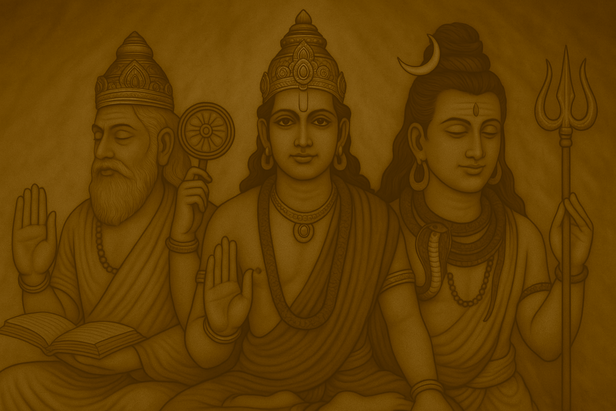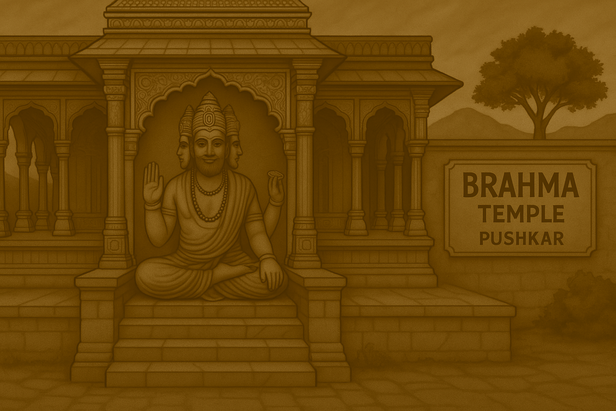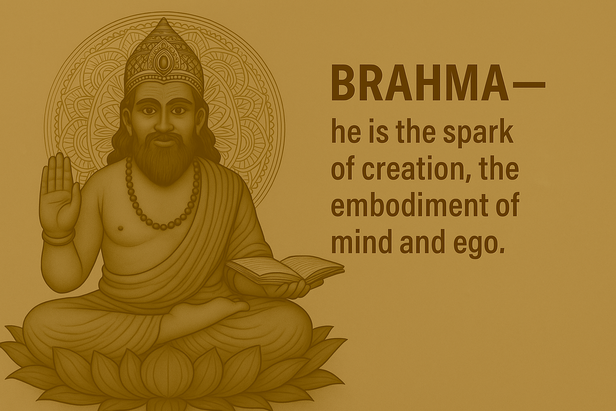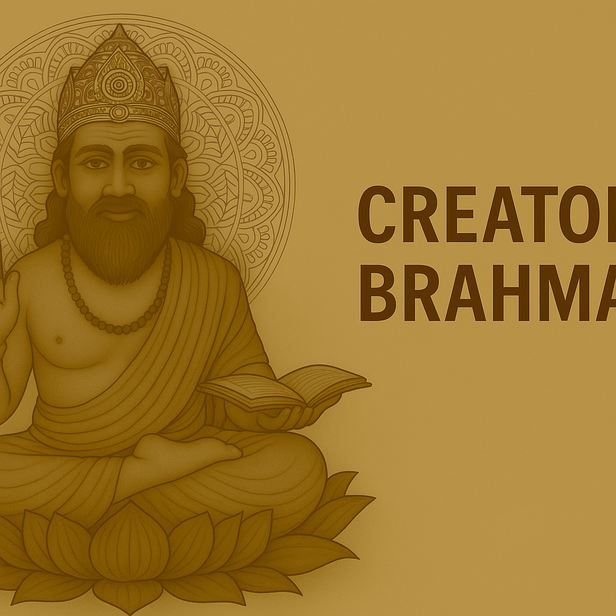Why the Creator of the Universe Was Cursed to Be Forgotten Forever
Noopur Kumari | Apr 30, 2025, 16:36 IST
( Image credit : Timeslife )
He created the universe, gave life to Gods, humans, and time itself… yet today, barely anyone folds their hands before him. Why is Brahma—the supreme creator—forgotten in temples and hearts alike? This gripping article uncovers the untold truths, ancient curses, and deep symbolism behind Brahma’s mysterious absence from modern worship. From divine betrayal to cosmic justice, from Pushkar’s lost rituals to the emotional reality of being forgotten despite doing everything right—this is not just mythology, it’s a mirror to our lives. A story of creation, ego, and silent sacrifice—this is the tale of the God we all owe our existence to, but never remember.
We disregard the creator, we fear the destroyer, and we submit to the preserver. The first of Hinduism's Holy Trinity and the architect of existence, Brahma, is hardly ever worshipped, hardly acknowledged, and nearly forgotten in daily devotion. Isn't that odd? Imagine establishing the seeds of life, building a whole universe, and then vanishing into oblivion. Through lost traditions, potent symbolism, and poignant truths that resonate with our lives, this piece explores the enigma of why Brahma, the God who gave us life, is no longer prayed to. Let's discover the sad yet holy tale of the Creator's silence.
A reality we frequently overlook—desire, even in divine places, can lead to downfall—is revealed by one of the eeriest stories in Hindu mythology. The creator, Brahma, fell in love with Saraswati, his own creation. He turned his heads in all directions to pursue her as she turned away from him. Brahma's fifth head was removed by Lord Shiva, who was horrified by this preoccupation and cursed him to be forgotten in worship. This is a story about us, not simply about gods. It serves as a reminder that unbridled desire may blind even the most intelligent people, and that unfettered ego can invite divine discipline. Dharma must be obeyed even by inventors.

In contrast to Vishnu or Shiva, Brahma had a brief function; he created and then withdrew. His work was heavenly, yet worship diminished his presence. He makes us think about the unseen makers in our lives—those who create, raise, and then fade into the background. Similar to parents who give up everything only to be forgotten over time. The narrative of Brahma represents us and is not merely a myth. It demonstrates how desire may obscure wisdom, causing even the godly to falter. His fall from grace serves as a timeless reminder that even gods can become shadowy when they create without humility and love without self-control.

In Pushkar, out of all the temples in the region, only one represents Brahma. Why? Because dishonesty had consequences, even for a god. The universe didn't remain mute when Brahma lied to establish his dominance. His withdrawal of worship served as a reminder that pride is weaker than truth, not because he was hateful. The fact that Brahma reflected human imperfections does not imply that he is not divine. He also teaches us a timeless lesson: the true routes to reverence are honesty and humility. Because of this, Brahma is a faint whisper of lost splendour, but Shiva and Vishnu are alive in every heartbeat.

In the depths of the Upanishads, Brahma isn't merely a god—he is the spark of creation, the embodiment of mind and ego. Yet, we aren’t meant to worship creation—we're meant to understand it. Seated on a lotus from Vishnu’s navel, Brahma reminds us that creation is born from preservation, and his four heads whisper the wisdom of the Vedas. But just as we don’t worship the pen, only the story it tells, we don’t worship knowledge—we live it. Brahma is that sacred pen: vital, divine, yet never the final destination. The real prayer lies in what we choose to create.

Consider your parents, teachers, and mentors as the people who helped to form your early years. After holding your hand and guiding you, they discreetly moved away. Are we worshipping them every day? No. However, they continue to exist in our decisions, values, and development. So too is the creator, Brahma. He created the cosmos and then allowed it to flourish, much like a parent who lets their child walk by themselves. Even though we don't hear his name in our daily prayers, his spirit is present in every breath we take. His absence isn't neglect; rather, it's the purest expression of love—creating, letting go, and seeing us grow.
The only location where Brahma is still fully revered is Pushkar, which is tucked away in Rajasthan's holy dunes. The lake serves as a portal of recollection and is thought to have been created from a lotus petal that Brahma himself discarded.Devotees assemble in hundreds every year on Kartik Purnima to sing Brahma's name, restoring his memory and redeeming his story.
Even forgotten gods have a place in the hearts of people who can recall their origins, as Pushkar tells us.
Brahma resides within us and is not lost. Every new thought, every new beginning, every new hope awakens his spirit once more. He is the universe's initial breath, its silent creator, and its invisible hand that decided to take a backseat and let others shine. The ability to create without claiming, to start and then let go, may be the purest expression of love. Even if he didn't have temples, his legacy endures forever. Thus, the next time you burn a diya or mutter a prayer, take a moment to express gratitude to the one who bestowed the gift of beginnings, not in adoration.
Explore the latest trends and tips in Health & Fitness, Travel, Life Hacks, Fashion & Beauty, and Relationships at Times Life!
1. The Curse of Brahma: Condemned by His Creation
2. The Role of Completion: Brahma’s Work Was Done

Brahma
( Image credit : Times Life Bureau )
In contrast to Vishnu or Shiva, Brahma had a brief function; he created and then withdrew. His work was heavenly, yet worship diminished his presence. He makes us think about the unseen makers in our lives—those who create, raise, and then fade into the background. Similar to parents who give up everything only to be forgotten over time. The narrative of Brahma represents us and is not merely a myth. It demonstrates how desire may obscure wisdom, causing even the godly to falter. His fall from grace serves as a timeless reminder that even gods can become shadowy when they create without humility and love without self-control.
3. Few Temples, Fewer Devotees: Rituals Lost in Time

Pushkar,
( Image credit : Times Life Bureau )
In Pushkar, out of all the temples in the region, only one represents Brahma. Why? Because dishonesty had consequences, even for a god. The universe didn't remain mute when Brahma lied to establish his dominance. His withdrawal of worship served as a reminder that pride is weaker than truth, not because he was hateful. The fact that Brahma reflected human imperfections does not imply that he is not divine. He also teaches us a timeless lesson: the true routes to reverence are honesty and humility. Because of this, Brahma is a faint whisper of lost splendour, but Shiva and Vishnu are alive in every heartbeat.
4. The Symbolism of Brahma: Not Meant to Be Worshipped, But Understood

Upanishads, Brahma
( Image credit : Times Life Bureau )
In the depths of the Upanishads, Brahma isn't merely a god—he is the spark of creation, the embodiment of mind and ego. Yet, we aren’t meant to worship creation—we're meant to understand it. Seated on a lotus from Vishnu’s navel, Brahma reminds us that creation is born from preservation, and his four heads whisper the wisdom of the Vedas. But just as we don’t worship the pen, only the story it tells, we don’t worship knowledge—we live it. Brahma is that sacred pen: vital, divine, yet never the final destination. The real prayer lies in what we choose to create.
5. The Emotional Truth: We Remember the Helpers, Not the Starters

brahma
( Image credit : Times Life Bureau )
Consider your parents, teachers, and mentors as the people who helped to form your early years. After holding your hand and guiding you, they discreetly moved away. Are we worshipping them every day? No. However, they continue to exist in our decisions, values, and development. So too is the creator, Brahma. He created the cosmos and then allowed it to flourish, much like a parent who lets their child walk by themselves. Even though we don't hear his name in our daily prayers, his spirit is present in every breath we take. His absence isn't neglect; rather, it's the purest expression of love—creating, letting go, and seeing us grow.
6. Pushkar’s Divine Redemption: Where Brahma Still Lives
The only location where Brahma is still fully revered is Pushkar, which is tucked away in Rajasthan's holy dunes. The lake serves as a portal of recollection and is thought to have been created from a lotus petal that Brahma himself discarded.Devotees assemble in hundreds every year on Kartik Purnima to sing Brahma's name, restoring his memory and redeeming his story.
Even forgotten gods have a place in the hearts of people who can recall their origins, as Pushkar tells us.
The Creator’s Silence Is Not His Absence
Explore the latest trends and tips in Health & Fitness, Travel, Life Hacks, Fashion & Beauty, and Relationships at Times Life!
